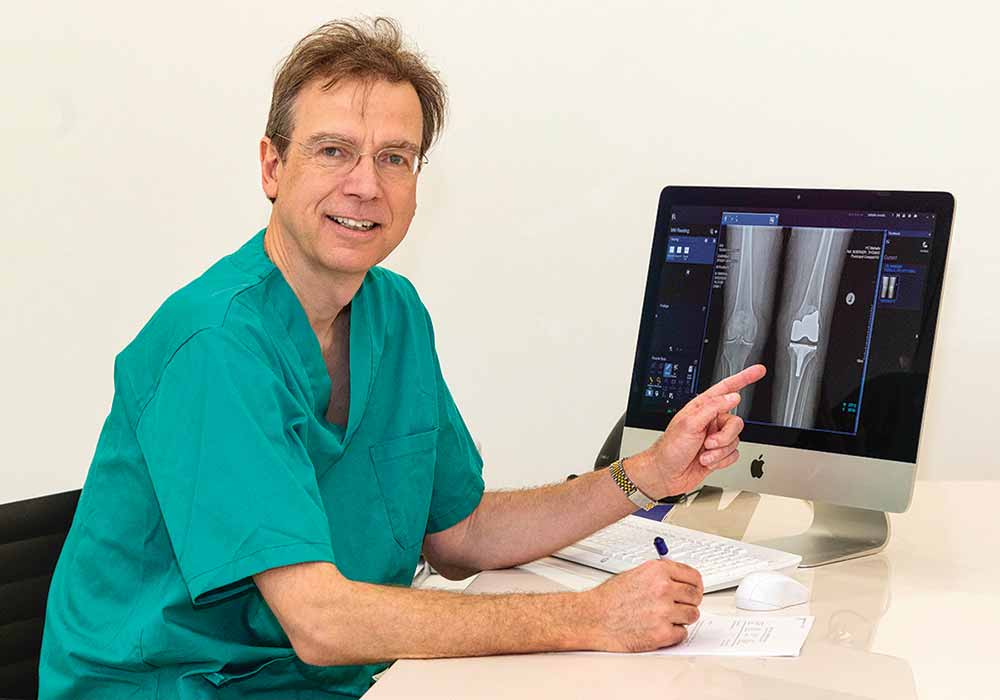Firstly, avoid the need to see an Orthopaedic Surgeon! Lifestyle choices significantly affect all aspects of our wellbeing, and optimal bone and joint health is no exception.
Words Dr. Thomas Boerger Consultant Orthopaedic Surgeon, specialising in Hips & Knees, operating in Marbella & Gibraltar
Firstly, avoid the need to see an Orthopaedic Surgeon! Lifestyle choices significantly affect all aspects of our wellbeing, and optimal bone and joint health is no exception.
Words Dr. Thomas Boerger Consultant Orthopaedic Surgeon, specialising in Hips & Knees, operating in Marbella & Gibraltar
Aim for good nutrition and maintaining a healthy weight, cut down on or stop smoking altogether and drink responsibly. Excess weight is a major cause of wear and tear of important joints such as the hip, knee, and ankle. Regular physical activity enjoyed in the sunny outdoors helps to promote good bone density, growth and repair as well as reducing the severity of osteoporosis which can lead to fragility fractures of the hip, wrist and spine.
Once we move past middle age, despite our best efforts to live healthily, we begin to experience age-related stiffness and generalised aches and pains. Pharmacies are able to reliably advise and safely recommend over the counter topical and oral pain-relief medication and support bracing options once you start to find the need to seek out help for your joint symptoms.
How Do You Know When You Really Need an Orthopaedic Surgeon?
When you have acute or chronic joint pain, your GP can comprehensively assess you for relevant degenerative and inflammatory joint conditions such as osteoarthritis and rheumatoid arthritis, which can typically be managed with medication, without surgery. Your GP can often prescribe physiotherapy, painkillers and sometimes inject anti-inflammatory medication directly into the affected joint to offer symptom relief and improvement in the condition.
You need to see a specialist Orthopaedic Surgeon to consider definitive treatment options when you have done all of the above and continue to be troubled by persistent symptoms and painful joints. Many of us know this ongoing pain can affect our mental health too, making us feel down, as we’re no longer able to join friends for a game of golf, to go for a quiet walk after dinner, or even sleep comfortably.


SELECTING AND SEEING AN ORTHOPAEDIC SURGEON
During the first consultation:
Above all else, the Orthopaedic Surgeon you choose should be professional, caring and interested in you as a person, not just a patient. The initial interview with you should be comprehensive and you should feel free to tell your story.
You can expect to have high quality radio-images such as joint X-rays taken there and then. You should then be able to view these with your Orthopaedic Surgeon who should explain the findings to you clearly, and follow up with a report.
After the consultation:
You are now in possession of multiple options. You should have some initial understanding of what has been recommended. You should be given further opportunities to ask more questions about any specific operative procedure on offer. As a minimum standard, your Orthopaedic Surgeon who has offered you joint replacement surgery should be fellowship-trained in Arthroplasty (joint replacement surgery) and should have a specialised expertise in the procedure recommended to you.
If you now wish to proceed with joint replacement surgery, you should be given an explanation of what happens next, from tests, implant type and lifespan, anaesthesia, rehabilitation and aftercare.
Most importantly, you should never be rushed or feel pressured into any decision. Your Orthopaedic Surgeon should offer you another appointment to discuss any queries you may have if you wish.
ONCE YOU HAVE DECIDED TO GO AHEAD WITH SURGERY
Before surgery:
You may wish to request more information from your surgeon such as whether their immediate team is complete with dedicated anaesthetists and operating theatre staff and if they are annually appraised and revalidated by the corresponding professional regulatory body.
After surgery:
Now you should be fully informed about the next steps, offered adequate pain management and associated therapy towards your discharge from hospital. You and your family should be given opportunities to ask questions. Clear post-operative care and post-discharge review plans should be provided, together with a contact in the immediate post-operative period for any concerns arising upon returning home. Finally, any questions?
INFO
Dr Thomas O. Boerger
Feel free to contact me on WhatsApp, phone, or email.
Full contact details are on my website: www.thomasboerger.com
This article has been written by Dr Thomas O. Boerger, MD FRCSI (Tr&Orth) Consultant Orthopaedic Surgeon, who obtained his primary medical qualification from Berlin, Germany, and who is fully post-graduate Surgical and Orthopaedic sub-specialty trained and qualified in London. Dr Boerger led in, and completed, Orthopaedic research projects, and successfully published with the Department of Biomechanical Engineering, Imperial College, London and the University of Leeds, UK. He has also specific Arthroplasty (Hips and Knees) and Soft tissue/Ligamentous reconstruction fellowship experiences in Florence, Italy and Canberra and Sydney, Australia. Dr Boerger is currently operating in St Bernard’s Hospital, Gibraltar, and High Care International Hospital, Marbella.
